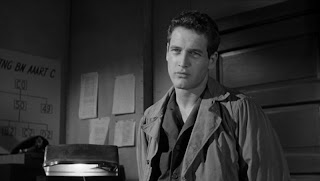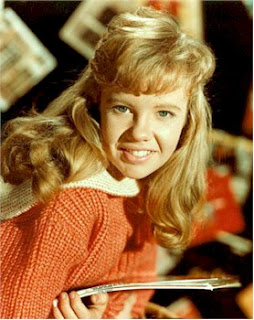Werth: I'm binging on birthdays because today is the birthday of not one, but two great character actors, Eileen Heckart and Arthur O'Connell.
Wise: They not only shared a birthday but they also shared the Broadway stage in the premiere of William Inge's Picnic in 1953 and the silver screen in 1956's Bus Stop.
Werth: Eileen was the younger of the two Oscar-nominated actors, greeting the world as Anna Eileen Herbet in Columbus, OH. Eileen graduated from Ohio State and while her husband was away at war, she moved to NYC to pursue a stage career. She would go on to become a Tony-nominated fixture on the Great White Way and found her way into the fledgling television biz performing stage properites on classic shows like The Ford Theatre Hour and Lux Video Theatre. Her road to Hollywood was a little rougher, as her looks didn't easily translate to the screen. But in 1956 she was in four—count 'em four—films and earned her first Oscar nomination for the camp classic, The Bad Seed.
One of those films was also a big starting vehicle for a then fairly unknown actor named Paul Newman. Somebody Up There Likes Me is the film adaptation of boxer Rocky Graziano's autobiography and follows the young Rocky from boyhood no-goodnik, to adult no-goodnik, to boxing champion.
Wise: But not up the steps of the Philadelphia Art Museum, I assume.
Werth: Filmed by director Robert Wise in black-and-white, the film maintains a gritty, noir-ish look at poverty-stricken New York and Brooklyn and at the shady world of prize-fighting. Newman is a wonder to behold, his classic good looks busted into broken noses and swollen eyes care of makeup artist William Tuttle.
Wise: That and his boxing trunks.
Werth: And only six years Newman's senior, Heckart plays Rocky's mother, Ma Barbella, a guilt-ridden mother who only wants the best for her son—even when he doesn't deserve it. Heckart was wonderful at playing flawed survivors.
As Ma, she lives with the guilt of knowing that her husband's abusive, downward spiral into the shit-heel we see is all because she begged him to stop boxing, killing his dream at the expense of her desire not to see his mug get beat-up all the time. Wrapped in a shawl watching Rocky get the crap knocked out of him on television, Ma has to re-face the consequences of the sweet science.
Wise:I bet Newman's agent was doing the same thing.
Werth: While the fight scenes are not as realistic as a post-Rocky and Raging Bull audience might be used to, the black-and-white photography of the fight scenes brings the ring into stark-reality, the audience encircling it thrown into darkness as they watch two men punching their way to what they hope will be a better life. Cinematopgrapher Joseph Ruttenberg earned an Oscar for his work on the film.
Heckart would join the Oscar Winner's Circle in 1972 when she won for the role she created on stage in Butterflies Are Free, before going on to a busy career in television playing everything from Mary's aunt on the Mary Tyler Moore Show to playing Ellen's Grandma on Ellen.
Wise: Arthur O'Connell had a similarly varied career, making his big break as a reporter in the final moments of Citizen Kane (1941) before earning an Oscar nom for Picnic (1955), sharing screen time with James Stewart in Anatomy of a Murder (1956), and playing a friendly pharmacist in a series of ads for Crest. This versatility came in handy when he joined the cast of Frank Capra's Pocket Full of Miracles (1961) in a small but pivotal role.
The film, a remake of Capra's own Lady for a Day (1933), features a deep bench of some of Hollywood's great character actors.
Werth: And Ann-Margret playing Ann-Margret.
Wise: The film stars Glenn Ford as Dave the Dude, a superstitious gangster on the make who refuses to seal a deal without first buying a rosy-cheeked fruit from Apple Annie (a bedraggled Bette Davis).
Werth: There should be a reality show based on this.
Wise: O'Connell plays Count Alfonso Romero, the potential father-in-law to Annie's daughter, and the role calls for a very nuanced take—stern enough to put the ruse at risk, but tender enough to make audiences root for the romance to succeed—and O'Connell succeeds brilliantly. Davis has a lot of fun in the first half of the film playing a drunk guttersnipe with a heart of gold, and later, after she's had a makeover and the script calls for little more than smiling beatifically, she still radiates the passion of a mother who would do anything for her child.
Peter Falk has a few great lines (and received a Best Supporting Actor nomination) as Dave's sidekick Joy Boy. But it's veteran scene-stealer and Film Gab favorite Edward Everett Horton who seems to
be having the best time onscreen, making sly nods to the audience while taking full advantage of all the plum bits that Capra and his screenwriters were feeding him.
Even amidst this wealth of talent, O'Connell shines, bringing dignity and humor to a role that anchors the madcap shenanigans around him.
Werth: So, Wise, are you ready to dig into this cake?
Wise: I'll take two pieces. One for now and one for next week's Film Gab.

























